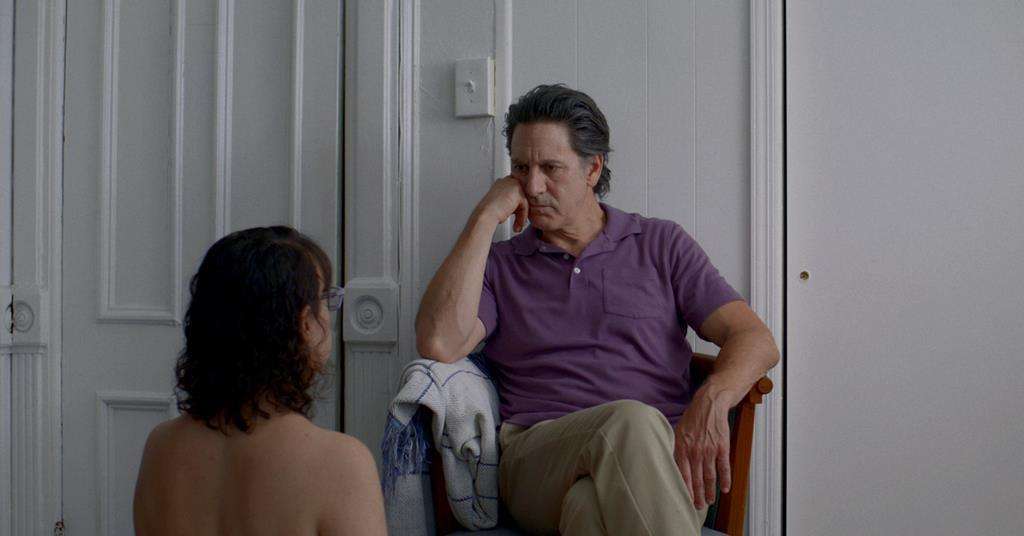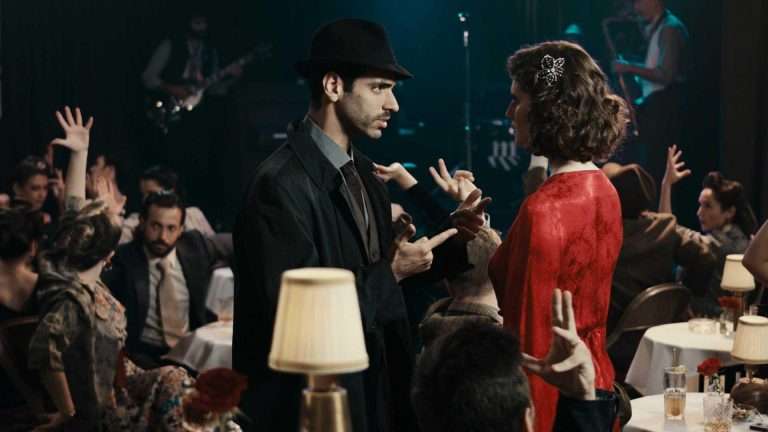“Do you think people can change?”
This is the question that kicks off writer-director Joanna Arnow’s deadpan and darkly comic feature debut, The Feeling That the Time for Doing Something Has Passed. It’s a question that the film keeps circling back to, conveying a sense of millennial anxiety and dread that perhaps holding out hope for a better and more vibrant future – one that isn’t plagued by incessant anxieties around the climate crisis, financial insecurity in a post-capitalist system, or finding a partner with whom you can be truly emotionally vulnerable – is essentially, pointless.
There’s something about millennial fears that are different from other generations; a generation that’s spending its working life living through record levels of job insecurity has had its resilience tested via a pandemic and multiple ongoing wars and living with increasing apathy towards public institutions and systems of government. All these factors and much more have contributed to a feeling of ever-present nihilism – is there even a point in trying if the world seems to be hell-bent on destroying itself?
It’s important that, as the viewer, you form your own opinion about this undercurrent of nihilism that flows through the film. The nihilism is so blatant, so obvious, that depending on how you read it, the film could come across as an absurd and tongue-in-cheek take on surviving as a millennial in Brooklyn or a desperate cry for help from a narrative that’s this close to being on the verge of a nervous breakdown. Perhaps, much like Joachim Trier’s The Worst Person in the World (2021), Arnow’s film is a bit of both. As a character says when he has a minor epiphany in Trier’s film, “I wasted so much time worrying about what could go wrong. But what did go wrong was never the things I worried about.”
It’s interesting that, at this year’s JIO MAMI Mumbai Film Festival, you could see two films that are firmly rooted in contemporary anxieties, but the eventual answers they give stemming from those anxieties are diametrically opposite of each other. Aki Kaurismäki, in his latest offering, Fallen Leaves (2023), opts for a hopeful outlook – that it’s love and the possibility of sharing our life with another that can help us overcome our demons and survive in an otherwise unforgiving world. Arnow, on the other hand, gives a completely different answer. In her film, we’re slaves to self-loathing and low self-esteem, and no amount of hope – which is only fleeting anyway – can help break this cycle. We’re condemned to a life of mediocrity, governed by the feeling that our life may have amounted to something more, except it’s very hard to put a finger on exactly what that ‘more’ really is.
The Feeling That the Time for Doing Something Has Passed follows the life of Ann, a Jewish woman in her early thirties who feels stuck in her life: she’s stuck in a thankless corporate job that she doesn’t enjoy and doesn’t seem to be going anywhere, stuck in a non-serious BDSM relationship with an older, male dom (Scott Cohen) that’s nearly coming up to a decade, and she’s stuck with her dysfunctional Jewish family who are disappointed in her and constantly judge her for her choices. Arnow herself plays the film’s protagonist, Ann, apart from writing, directing, and editing the film.

What is ultimately impressive is the degree to which Arnow is able to craft situations and visual gags of sheer hilarity from this overarching feeling of existential dread. For example, let’s take her professional life. In one of the earlier scenes, in a team boardroom meeting, Ann enquires about the five-year strategic plan for the company. The way the shot pans out and cuts – as a visual reveal that answers her question – is reminiscent of the kind of visual gags that filmmaker Edgar Wright mastered in The Cornetto Trilogy, where humor was set up through unexpected things cropping up in the frame. Arnow’s approach and treatment of visual gags is way more deadpan, but the setup is similar.
It’s not just the sheer number of visual gags that make Arnow’s film one of the best dark comedies of recent times – during one of her BDSM encounters, she’s dressed up in a pink piggy costume with a ball gag in her mouth, and she looks visibly bored as she’s asked to respond with an ‘oink.’ There’s an alacrity and sharpness in Arnow’s writing that gives a sense of pathos to Ann’s existence. When her older, male dom sex partner pushes her to tell him about what she likes, Ann responds by saying, “I don’t know.” And you can sense that she’s serious – Ann doesn’t know if she’s disinterested in life, lonely, depressed, or perhaps a bit of all three. When she tries to make small talk with a colleague at work, showing her a picture of a lamp that she found online, her colleague targets her insecurities by saying that it’s called a salt lamp, which is a “thing for lonely people.”
Ann continually obsesses over the question, ‘Do you think people can change?’ It is more of a rhetorical question she’s trying to answer for herself through the course of the film, which really is: are some people condemned to be lonely forever? The film is divided into five chapters – each of them dedicated to the people with whom Ann tries to have a connection to alleviate this feeling of loneliness and self-loathing that haunts her.
Also, Read: All of Us Strangers (2023) Movie Review – Terrific Acting Quartet Breathes Life into Andrew Haigh’s Synth-Pop Ghost Ballad
At one point in the film, when she meets Chris (a genuinely disarming performance by Babak Tafti), you think that she’s finally found the answer to the question that she’s been asking herself all this while. With Chris, Ann seems to develop a different outlook on life and her future. “I think people can like more than one type of relationship,” says Ann, believing for the first time that clinging on to hope doesn’t always mean that one is setting themselves up for disappointment. Ann’s sardonic outlook on life is a mask that does two things – it protects her from any disappointment because she doesn’t believe she deserves better to begin with, but more sadly, it also stops her from taking any real emotional risks that may help make her feel less lonely.
And that, right there, is the real achievement of Arnow’s debut feature. Through a combination of darkly comic punchlines, visual gags, and sardonic wit, Arnow puts her finger on the pulse of an ever-present contemporary fear – that perhaps, we are indeed condemned to be lonely because we lack the courage to keep on taking risks that make us emotionally vulnerable. Arnow’s humor masks a film that’s extremely perceptive of our deep-rooted fears, making her feature debut one of the best films of the year.
★★★★
The Feeling That the Time for Doing Something Has Passed had its South Asian premiere at the 2023 Mumbai Film Festival (MAMI).
The Feeling That the Time for Doing Something Has Passed (2023) Movie Information:
External Links: IMDb, Rotten Tomatoes
Cast: Joanna Arnow, Scott Cohen, Babak Tafti
Language: English
Genre: Comedy/Drama
Runtime: 1hr 28m



![Jalsa [2022] Review: A Well-Made Gripping Drama, Steering Out Of Control By The End](https://79468c92.delivery.rocketcdn.me/wp-content/uploads/2022/03/Jalsa-2-768x384.jpg)

![Arranged Marriage [2022] Review – An absurd satire that is unable to use its bluntness to good measure](https://79468c92.delivery.rocketcdn.me/wp-content/uploads/2022/12/Arranged-Marraige-2022-Movie-Review-768x405.jpg)

